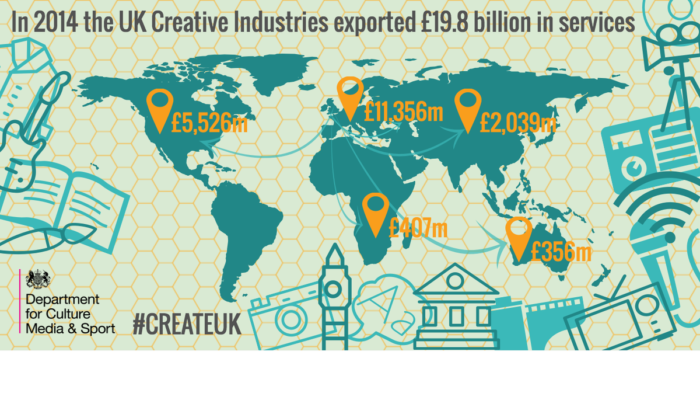22nd August 2016 Science and Innovation Network
John Kampfner on Our Creative Industries

British culture is famous around the world, with our theatre, our television, our music and our films thrilling millions who have never visited the country and proving a major attraction for many who do.
Attention may have shifted this summer from Sherlock, Adele and Harry Potter to our cyclists, gymnasts and rowers at the Rio Olympics. But alongside the Premier League and our royal family, we know it is our track record in entertainment that is one of our best-loved assets, as well as an increasingly important part of the UK economy.
Our culture is innovative, imaginative, inclusive and diverse. Our national museums and galleries, such as the Tate and the National Gallery, are free to all visitors as a demonstration of that ideal. We are proud that our theatres create groundbreaking work such as War Horse, which used giant puppets to tell the story of the First World War, and agree with JK Rowling that it was astonishing that anyone was surprised at the casting of a black actress, Noma Dumezweni, as Hermione in the new West End production, Harry Potter and the Cursed Child – a show which looks set to be as big a hit as the 8 films inspired by the bestselling books. And we expect this to continue.
The Creative Industries Federation is an independent membership body representing the UK’s publicly-supported arts, the for-profit creative industries and cultural education. The overwhelming majority of our supporters did not want to leave the EU. But we are now being pragmatic and have no intention that our sector will be any less imaginative, entrepreneurial or successful in a future outside the EU. That would be plain daft.
Our creative industries are an economic success story, worth £84.1 billion a year. We have been the fastest growing sector in recent years, expanding at nearly twice the rate of the rest of the UK economy. There is a business argument, alongside the cultural case, for building on our track record in these areas so government support – through, for instance, tax credits, public investment in the arts and extension of fast broadband – is essential whatever the challenges of Brexit. As a nation, we invest in success, as was confirmed at Rio, where our medal tally was built not just on talent but on years of National Lottery funding.
And we know that for many companies, it is the environment created by our creatives that helps make cities like London, Manchester, Edinburgh and Bristol places where people want to live. If you work hard in the City of London, the evidence is you want a vibrant city for when you’re not at your desk trading on the international financial markets. For businesses such as advertising, creative tech and the automotive industry, the quirky, boundary-pushing edge provided by our musicians, models and designers is crucial to the ongoing innovation that makes for good commerce.
As we seek to build a new role in the world, we will work closely with the government to safeguard talent, develop a simple and effective visa system and protect the intellectual property rights which are crucial to ongoing success.
But the arts have always been cross-border, outward-looking and willing to accept the challenge of thinking in new ways so we anticipate opportunities, too. Even before the EU referendum, the Federation had launched an international advisory council chaired by Tom Fletcher, an adviser to 3 former British prime ministers, and UK ambassador to Lebanon, to give our sector a global perspective. That work now looks set to be even more important. A consequence of the EU vote could be more opportunities – and a greater need – to develop different markets and make new connections elsewhere in the world.
But we must, of course, preserve our strong ties with Europe, too. It is currently the market for 57 per cent of our creative exports and there is a long tradition of bands, orchestras and theatre companies crossing the Channel in both directions. We will work hard to secure the arrangements that can make that continue to happen.
In our increasingly fractured world, culture can be a glue when the cracks are showing. It is a way of maintaining vital contacts even when inter-government relationships get tricky, as the loan of the Cyrus cylinder, the world’s first declaration of human rights, from the British Museum to Iran demonstrated. It can also ease other tensions. At the BBC Proms, one of the regular heart-warming moments is the appearance of Daniel Barenboim’s West-Eastern Divan orchestra, founded to promote understanding between Israelis and Palestinians.
We have no doubt about the value and importance of what we do, culturally, socially, economically, diplomatically. The UK’s arts and creative industries not only help build brand Britain. We believe we are brand Britain – the epitome of all that is best about this country.

Very good article. I mostly agree with you. One thing though, I think the black Hermione debate is irrelevant here. Just cos an extremely small proportion of the UK population is prejudiced, it is not worth mentioning it here on a blog that the whole world can see. There is no point giving the wrong impression to the rest of the world that Britain is more racist than it actually is. I hope this comment is helpful, pls don’t be alarmed by any of my comments.
In the UK, Art and Design education is suffering greatly. Why no mention of this fact?